|
1 High Street
Sidcup
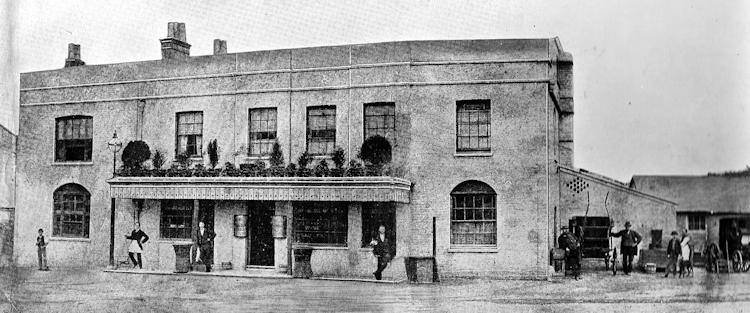
Above photo, date unknown. |
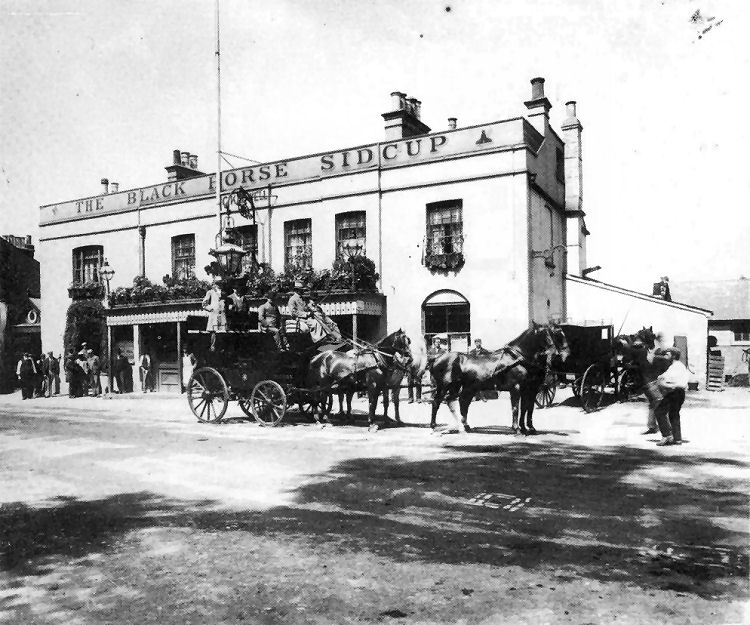
Above photo 1897. |
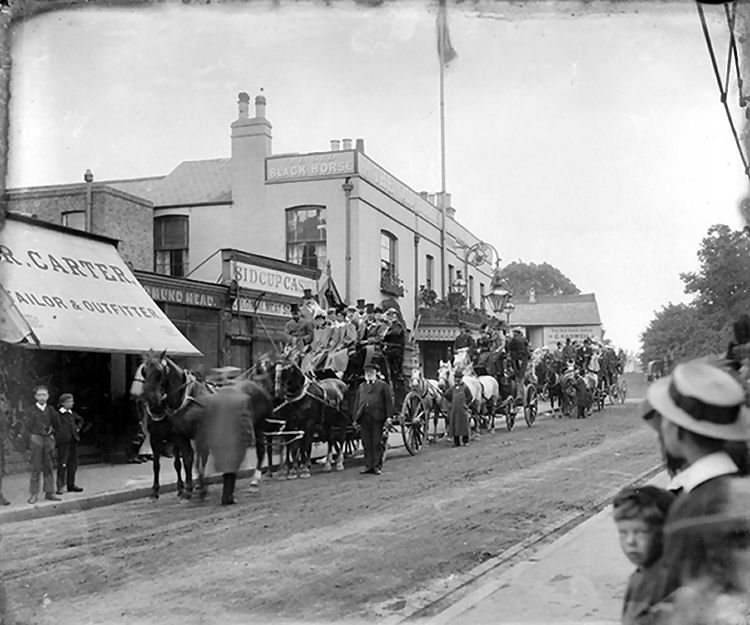
Above photo 1898. |
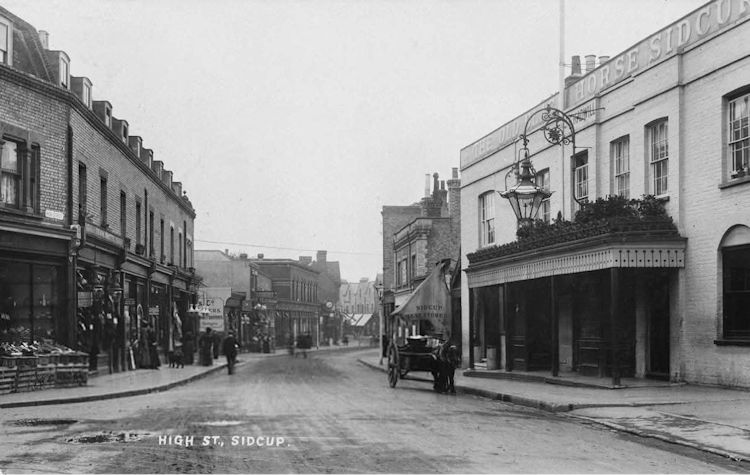
Above postcard, circa 1900. |

Above postcard, circa 1900, kindly sent by Rory Kehoe. |
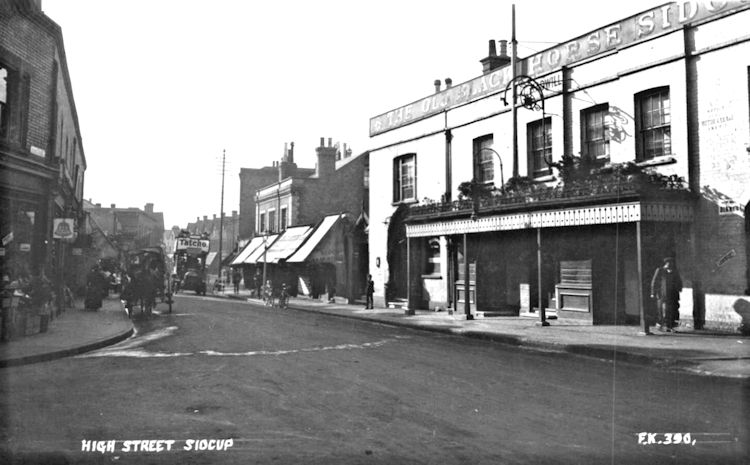 Above postcard circa 1908, kindly sent by Rory Kehoe.
I believe that this famous old coaching inn, formerly owned by Style &
Winch's Medway Brewery, closed in 2008. Despite being a Grade II Listed
Building, Bexley Borough Council gave permission for the building to be
demolished. A proviso stipulated, however, that whatever was built on
the site of the pub, it had to have a similar-looking front elevation as
the original building. Looking at the 2025 image of this part of
Sidcup's High Street, which now hosts a Travelodge and Waitrose, it's
reasonable to imagine that the architect responsible for ignoring the
stipulation and designing a concrete box, was either blind, drunk, or
both! |
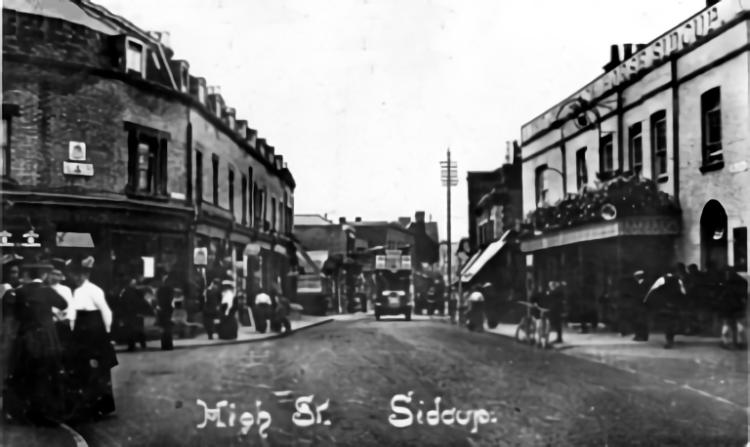
Above postcard, circa 1909, kindly sent by Rory Kehoe. |

Above postcard, circa 1909, kindly sent by Rory Kehoe. |
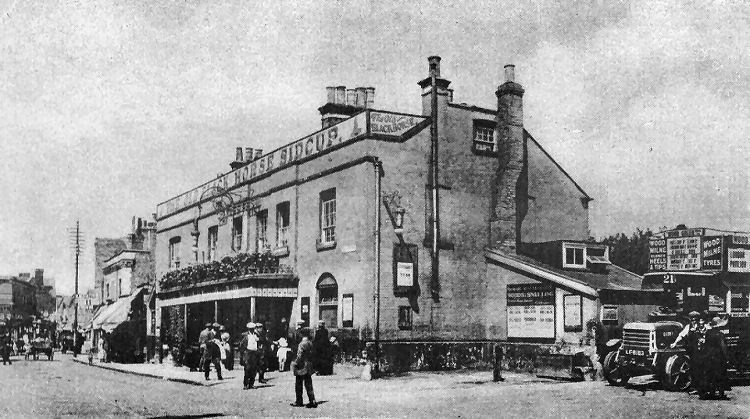
Above photo, circa 1912, kindly sent by Rory Kehoe. |
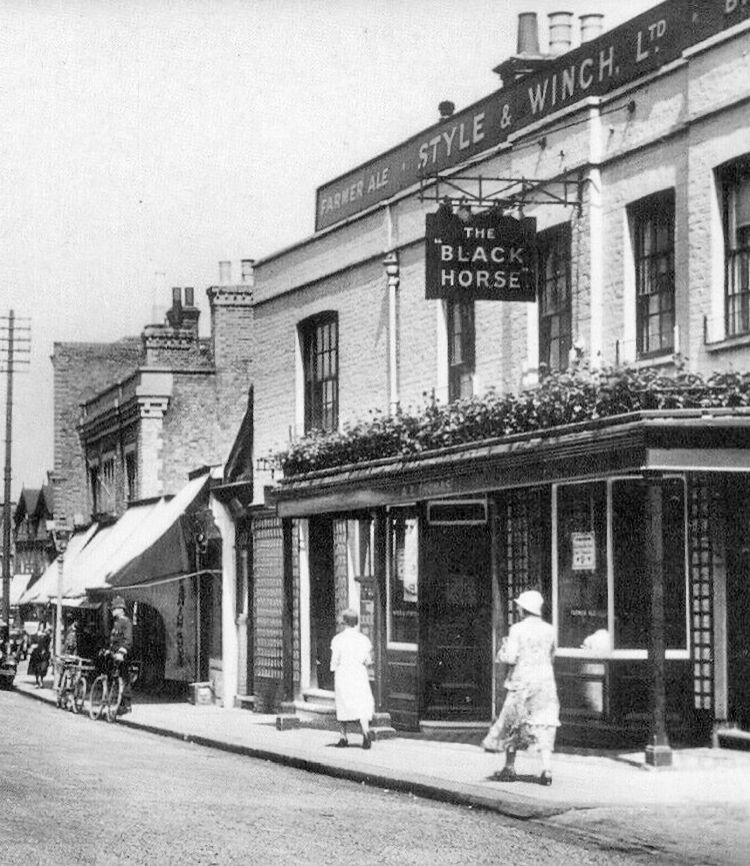
Above photo, circa 1933. |
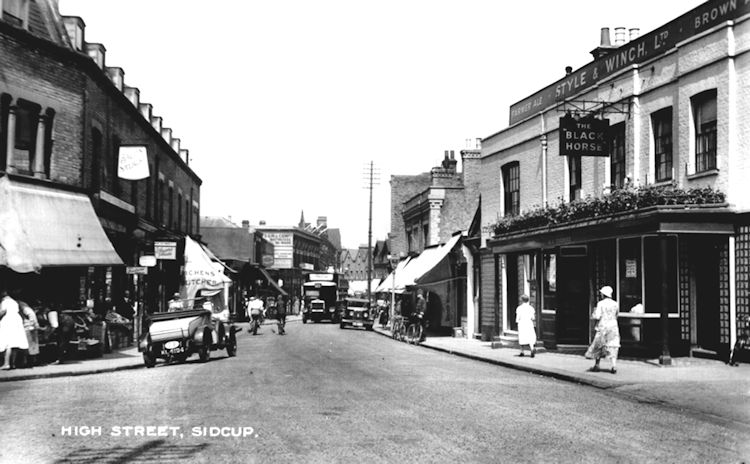
Above postcard, circa 1933, kindly sent by Rory Kehoe. The name of the
licensee, A E Thomas, is written large over the front door and the pub's
signage leaves no doubt that the pub was a tied house, within the estate
of Style & Winch's Medway Brewery, Maidstone. |
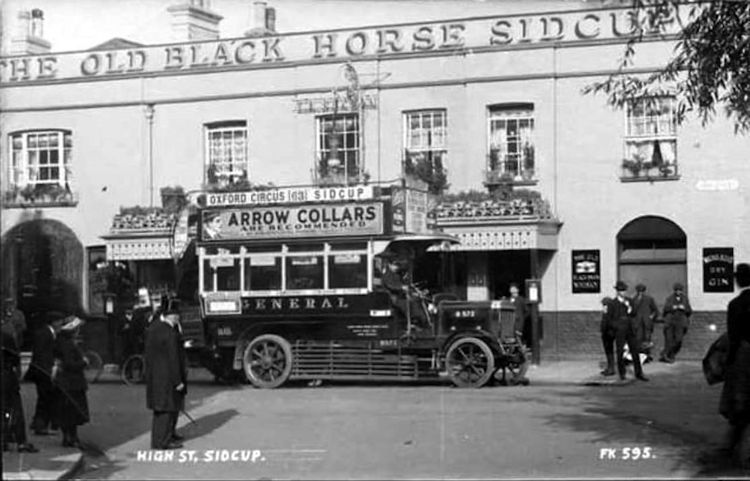
Above postcard, 1928. |

Above photo, 1933. |
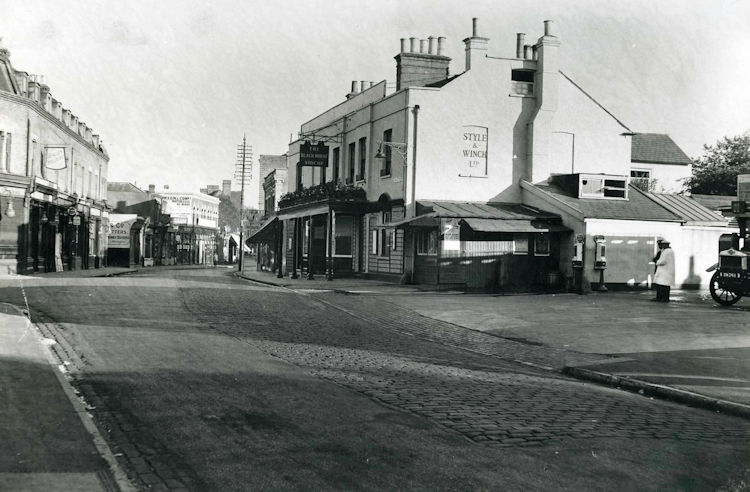
Above photo, 1933. |
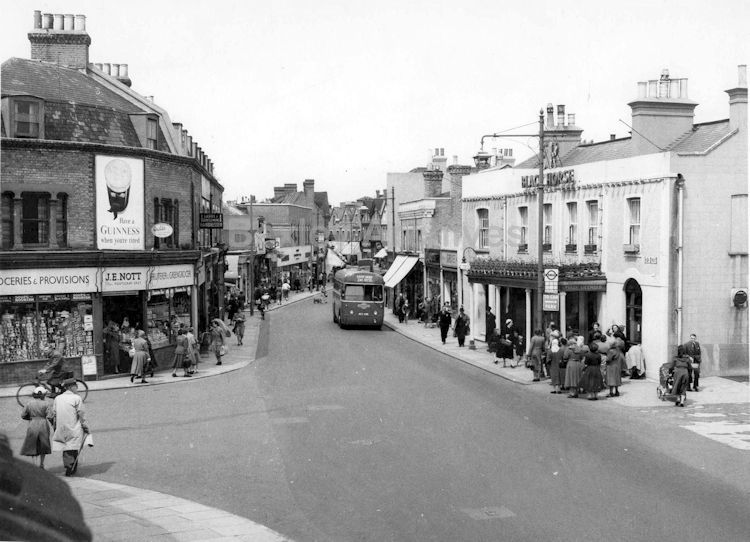
Above photo, date unknown. |
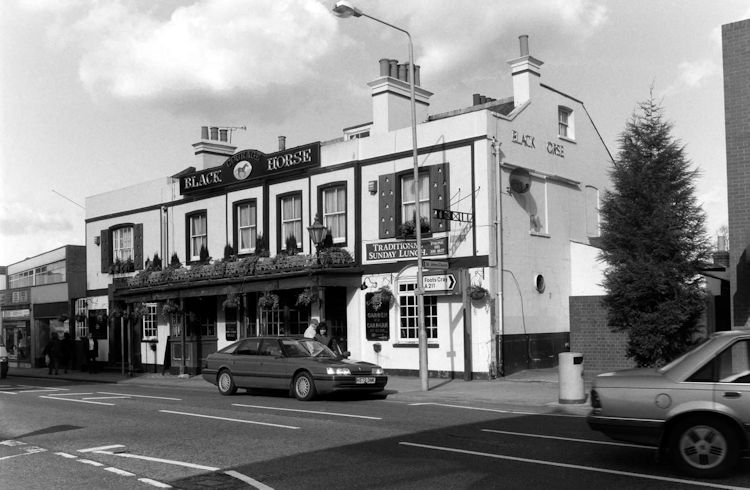
Above photo, 1995. |
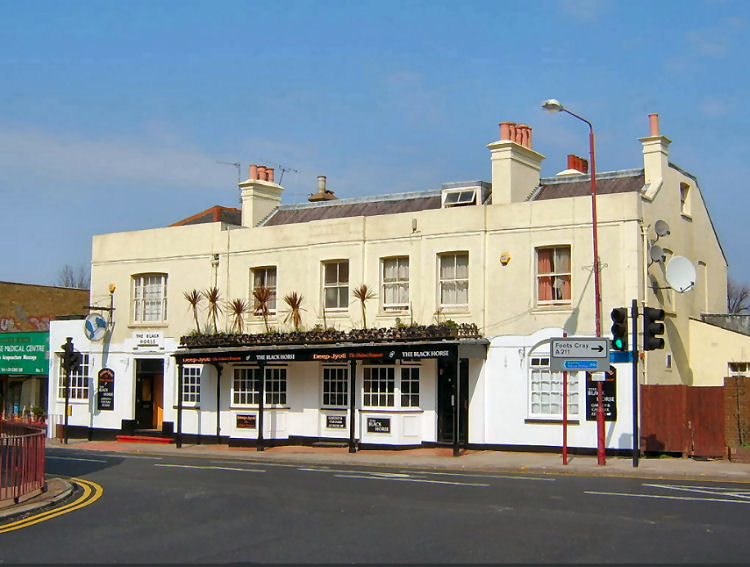
Above photo 2007, by Steve Thoroughgood. |
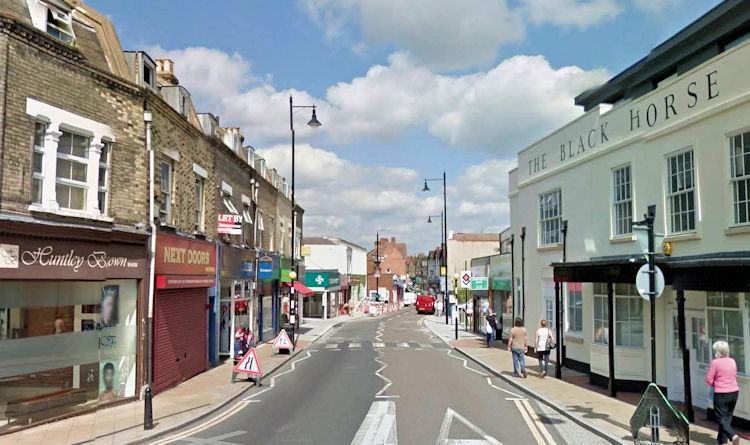
Above photo, 2014. |

Above photo, date unknown by Roger Botton. |
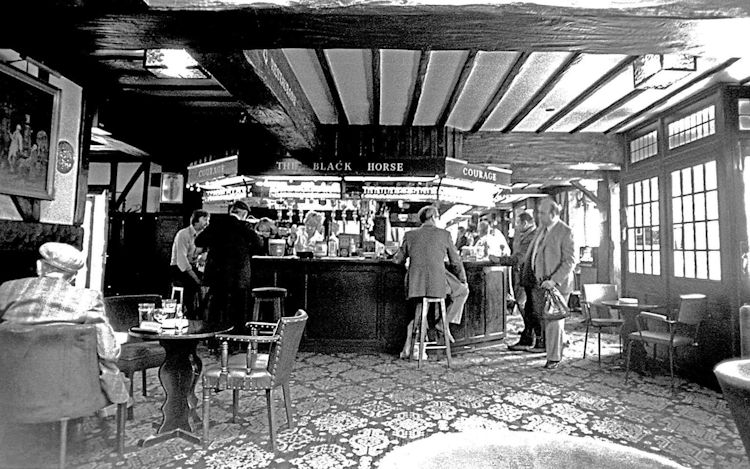
Above photo, date unknown. |

Above photo showing the location in 2025. Kindly supplied by Rory Kehoe. |
I have also seen this addressed as Foots Cray.
I also have reference to an "Old
Black Horse" addressed at Halfway Street, which I believe was later
renamed "Ye Olde
Black Horse." However, for a short time
in the early 1900s this pub was also known as the "Old Black Horse." I have
no dates as yet though. I am assuming that the above are indeed the same
building.
The pub after re-opening, date unknown, was renamed the "Blue
Rose."
|
From the Kentish Gazette, Tuesday 28 May, 1833.
On Thursday morning an inquest was held before Mr. Carttar, coroner of
Kent, at the sign of the "Black
Horse," Sidcup, on view of the body of Thomas Boast.
It appeared in
evidence that the deceased was, up to
the time of his death, in the employ of Mr. Nash, paper manufacturer, of
North Cray, Kent, and was coming to
London with a wagon laden with paper on Monday morning last. On arriving
at Sidcup the horses took fright
at a machine for cleaning wheat, which stood at the side of the road
(while the men carrying the same were
resting), and started off at full speed, and the deceased, in
endeavouring to stop them, was knocked down, and
the wheels went over his head and body. Every assistance was rendered,
but he died almost immediately.
Verdict, "Accidental Death," with a deodand of 1s. on the wagon and
horses.
|
|
West Kent Guardian - Saturday 2 October 1841.
Sidcup. Distressing accident.
An inquest was held, at the "Black Horse Inn," on Friday morning last,
touching the death of a youth named Arthur Hollands, the brother of Mr.
Hollands, of Farningham, who met with his death on the previous Thursday
under the most painful circumstances. From the evidence adduced, it
seems that the lad had been to the races on Tuesday and was returning
home with some friends in a fruit van, when near the turnpike gate he
alighted and attempted to stop the horse, but in doing so was thrown
down, the wheels passing over his head. The poor fellow was found by his
companions in a dreadful state, bleeding from the head and mouth, and
was taken to the above-named inn, when medical assistance was
immediately sent for, but in vain, the sufferer being so dreadfully
injured that he lingered in excruciating pain till Thursday morning,
when he expired. The jury having viewed the body, returned a verdict of
"Accidental Death."
The event has caused much sensation in the neighbourhood. The deceased
was about 15 years old, and was guard of the Farningham coach, and very
much respected by the public for his industry and attention to business.
His melancholy and ultimate end is much regretted by his numerous
friends.
|
|
Morning Post 27 July 1844.
SUMMER ASSIZES.
George Plummer, 50, was indicted, on Thursday, for the manslaughter of
his wife, by having neglected to provide for her support, and causing
her to be exposed to the inclemency of the weather without proper
sustenance. There were several counts in the indictment, varying the
form of the charge.
It will be recollected that the prisoner was indicted at the winter
assizes, 1843, but, from some cause or other, no one attended to
prosecute, and the prisoner was consequently discharged by proclamation.
A bill was subsequently preferred against him, and he was now brought up
to take his trial.
Mr. Bodkin appeared for the prosecution; the prisoner had no Counsel.
Mr. Bodkin, in stating the case to the Jury, explained that by law a
husband was bound to support and maintain his wife, and the charge
against the prisoner was that he had neglected to do so, and that by
reason of that neglect and the refusal of the prisoner to receive his
wife at a time when she was in a destitute and almost dying state, he
had caused her death, and was thus amenable to the present charge. The
Learned Counsel went on to say that the prisoner had filled the
situation of gardener to a nobleman in the neighbourhood of Sidcup, and
had been separated from his wife for some time before her death, and had
made her an allowance of half-a-crown a week. She became, however, in a
most destitute and miserable condition, and was found by a policeman
late at night, to whom she stated that she had no home to go to. He took
her to the prisoner's house, and asked him to admit her, but with
offensive language, he refused to do so, and the decease, very shortly
afterwards died, and from the medical testimony there could be no doubt
that her death was occasioned by her state of destitution and want of
nourishment. The Learned Counsel went on to state that it would appear
that directly before the death of the deceased, a medical gentleman, who
would be called before the Jury, had given her a letter to take to the
relieving officer of the district, requiring him to give the deceased
relief, but it would appear no attention was paid to the request. He
(the Learned Counsel) had no hesitation in saying, that if this letter
had been received by the relieving officer, he had grossly neglected his
duty in not attending to it. Every destitute person was entitled to
relief, and if any relieving officer, under such circumstances,
neglected to perform the duty that devolved upon him, there was very
little doubt that he would be liable to have a charge of a similar
nature to the present preferred against him. The Learned Counsel then
called the following witnesses Hannah Riley deposed that she lived at
Foot’s Cray, and knows the prisoner, and the deceased, hit wife. The
deceased died on the 23d of November, 1843, and on the Sunday before her
death she had asked witness to give her a lodging for the night. She
remained at witness’s house three or four days, and during that time she
appeared to be very ill.
Thomas Mumford, an illegitimate child of the deceased’s previous to her
marriage with the prisoner, deposed that he saw his mother on the 19th
of November, when she appeared very ill, and complained of great pain.
Prisoner and his mother had not lived together for some time before
this, and he used to allow her half-a-crown a week, which she generally
received on Sunday, and he believed she did so on the week previous to
her death.
Cross-examined by the prisoner:— Witness was not aware of the reason of
their being apart.
Mary Anne Mumford, wife of the last witness, spoke of the miserable
state of the deceased a short time previous to her death. She also
proved that the prisoner and his wife had been separated for four years,
and that he used to allow her half-a-crown a week.
Mr. T. Pritchard, surgeon, of Sidcup, deposed that he knew the deceased,
and had noticed her particularly for several days before her death. On
the 21st of November, two days before her death, she came to his
surgery, and at that time she appeared to be in a dying slate, and he
told her that she was not in a condition to go about, and indeed he
considered that she was hardly able to go away from his surgery. He gave
her a letter to the relieving officer of the district, in which he
described her condition, and requested him to relieve her. Shortly
afterwards he heard the was dead, and by the direction of the Coroner,
he made a post mortem examination of the deceased. He found the stomach
and bowels perfectly empty, the liver was diseased, and there was also
an extensive ulceration of the lower part of the body.
By the Court:— Witness had no doubt the death of the deceased was
accelerated by the want of proper nourishment and clothing.
William Earl, a police constable, stationed at Sidcup, deposed that on
the Wednesday previous to the death of the deceased person he saw her,
and had some conversation with her, during which she complained of the
conduct of her husband. She appeared very ill at this time, and he
persuaded her to go to the relieving officer. He saw her again at eleven
o’clock at night, and she was then very wet, and in a miserable state.
She went towards the house where the prisoner lodged, and witness heard
her ask him to take her in. Witness told the prisoner, who was at the
window, that his wife was in a miserable state, and wished him to let
her in. The prisoner replied that he had no lodging for her. Witness
told him that he was her husband and ought to provide for her; to which
the prisoner replied, that she was a nasty ——, and he should not get up,
or trouble himself about her, and he then shut down the window. After
this witness took the deceased to the house of the prisoner's father,
who also refused to receive her, and he then offered to give her a
shelter in the station house, but the deceased would not accept it, and
walked away. About three o'clock the next morning he found her in an
outhouse, and she was then wet through, and very ill. Witness got some
beer for her, which she drank, and he did not see her any more alive.
Sarah Coomber deposed that, at the time in question, her husband kept
the "Black Horse" public-house at Sidcup. On the Thursday before the
death of the deceased she came to witness’s house and wished for a
lodging. She appeared to be very ill and in a most destitute condition.
The prisoner was in the house at the time, and witness told him the
state of his wife, when he replied that she was no wife of his, and had
not been for many years. She allowed the deceased to remain in the house
during the night, and she was put to bed. The next morning she was
insensible, and died shortly afterwards.
A servant in the employ of Mrs. Coomber proved that she accompanied the
deceased to her bedroom, and she appeared so weak as to be hardly able
to stand.
Another witness deposed that a day or two before the death of the
deceased she came to her house, and, seeing her miserable condition, she
sailed to the prisoner who was passing at the time, and asked him to
take her away, when he replied, "Turn her out, I won’t have her."
Mr. Pritchard was re-called, and, in answer to questions put to him, he
said that the deceased would no doubt have lived for some time if proper
care had been taken of her. Diarrhoea was the immediate cause of death,
and he was of opinion that the death was hastened by her exposure to the
weather on the Wednesday night.
The prisoner, in his defence, said that he and the deceased had mutually
agreed to separate, and he allowed her half a-crown a week, which was
all he could afford. She had come to him several times in a most filthy
condition, and it was impossible that he could live with her.
Mr. Baron Gurney then addressed the Jury, and said there could be no
doubt that in law a husband was bound to provide for and support his
wife, and if by neglecting to do so, he caused her death, he would
subject himself to a charge of manslaughter. The present case, however,
presented some peculiar features. It appeared that the parties had
agreed to separate, and that the prisoner undertook to make his wife an
allowance of half-a-crown a week, and there did not appear to be any
proof that at the time the application was made to the prisoner to admit
his wife into his house on the night when the exposure to the weather
was said to have caused her death, that he was at all aware she was in a
dying condition. The Learned Judge then went through the evidence, and
left the case in the hands of the Jury.
After a short deliberation they returned a verdict of Not Guilty.
|
|
Kent Times, 11 January 1862.
BROMLEY.
Petty Sesions, Monday. (Before Viscount Sydney, chairman,
R. B. Berens, G. W. Norman, W. Waring and C. L. Wilson. Esqrs.)
James Andrews, a gunner in the Royal Artillery, was charged with
stealing a goose, value 6s., the property of Mr. Beacham, of
the "Black Horse Tavern," Sidcup. It appeared from the evidence
that on the previous Saturday the prisoner took down a goose that
was hanging in the passage. The prisoner said that he took the goose
in a "lark" and at first put up outside the door, and when he left
the house he carried it away about a dozen yards, and then asked a
man named Watson to carry it back to Mr. Beacham's and make an
apology for him. Under these circumstances, and Mr. Beacham not
wishing to press the charge, the prisoner was discharged.
|
|
Kent Times, 1 March 1862.
Window Breaking.
BROMLEY. Petty Sessions, Feb. 24. Present: C. L. Wilson, Esq.
(chairman), R. Boyd, S. Long, Coles Child, and F. M. Lewin, Esqrs.
William Knight, a German, was charged with having, on the evening of
Sunday, the 23rd alt., wilfully broken a pane of plate glass, the
property of Mr. John Beacham, landlord of the "Black Horse Inn,"
Footscray, of the value of 10s.
From the statement of complainant, however, it seemed doubtful
whether the damage committed was really wilful or accidental, and
under these circumstances, the charge was withdrawn, defendant to
pay for the injury.
|
|
From the Southeastern Gazette, 15 May 1866.
BROMLEY. Petty Sessions, Monday. (Before Coles Child, Esq., in the
chair, and Major .Foster, and R. B. Berens, C. Devas, F. M. Lewin, W.
Waring, and W. Whit-more, Esqrs.)
Moses Crouch, of Perry-street, Chislehurst, was charged with stealing a
coat from Mr. Beacham’s, “Black Horse Tavern,” Sidcup, under the
following circumstances.
On the previous Saturday a party of gentlemen from London visited Mr.
Beacham’s, and whilst they were in the pleasure grounds one of the
party, Mr. Crudgington, placed his over coat, which was worth 30s., upon
one of the seats, and when it was required some time after it was not to
be found. The prisoner had been seen in the grounds, and, as he had gone
also, suspicion fell upon him, and information was given to Sergeant
Dilkes, at the police station close by. The particulars were made known,
and about one hour afterwards Barrett, 129 R, met the prisoner at
Footscray, wearing the stolen overcoat. The prisoner first told the
constable that he had had it for two years, but at the police station,
when the coat was identified, he said that he found it in the cricket
field at Mr. Beacham’s, and seeing no one near it he took it away. He
now pleaded guilty, and was sentenced to three months’ hard labour.
|
|
From the Record of Deaths 1917.
DEATH.
Thomas Hill, born 1863, age 54, died 7 April 1917 at Charing Cross
Hospital, living at the "Black Horse," Halfway Street, Sidcup.
|
|
From an email received 6 February 2019. Just managed to identify the
latest one in my collection. Somebody has, years ago, tried to scratch
out the name of the pub, but not enough to defeat me.
George Kadwell from the Black Horse in Sidcup.
Regards,
Steve Shaw.
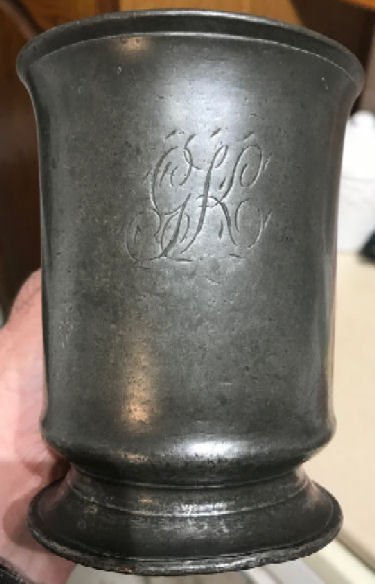 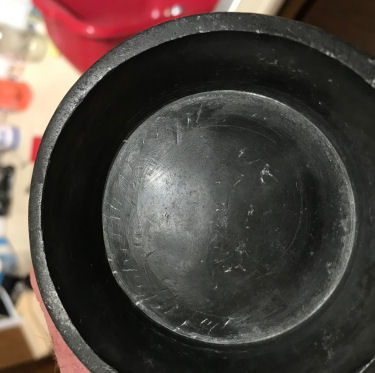 |
From an email received 17 June 2022.
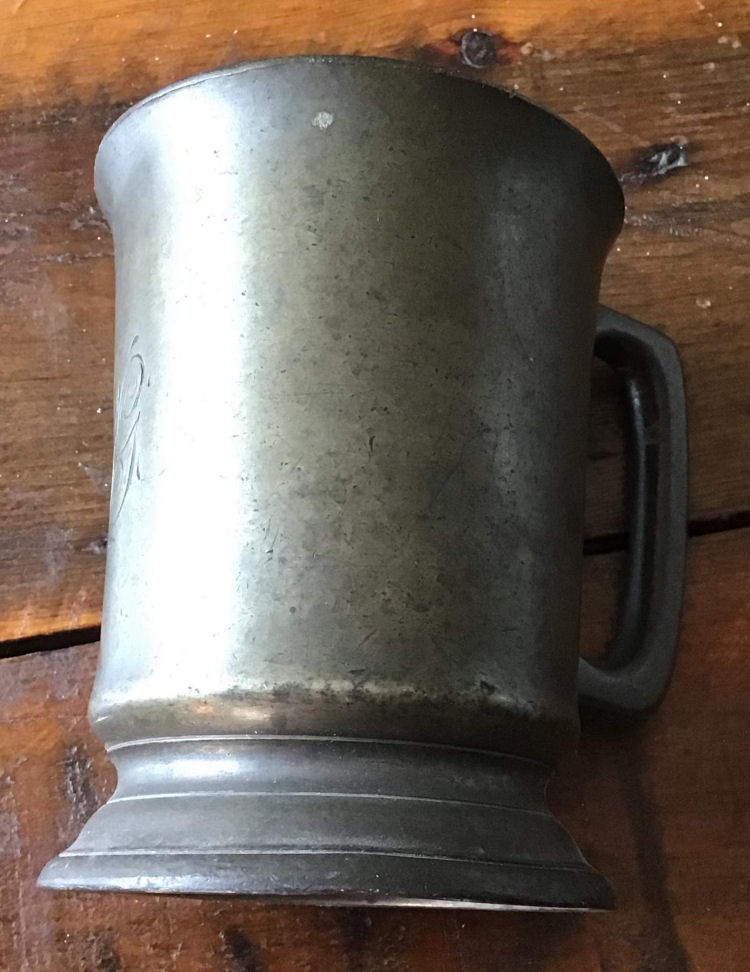
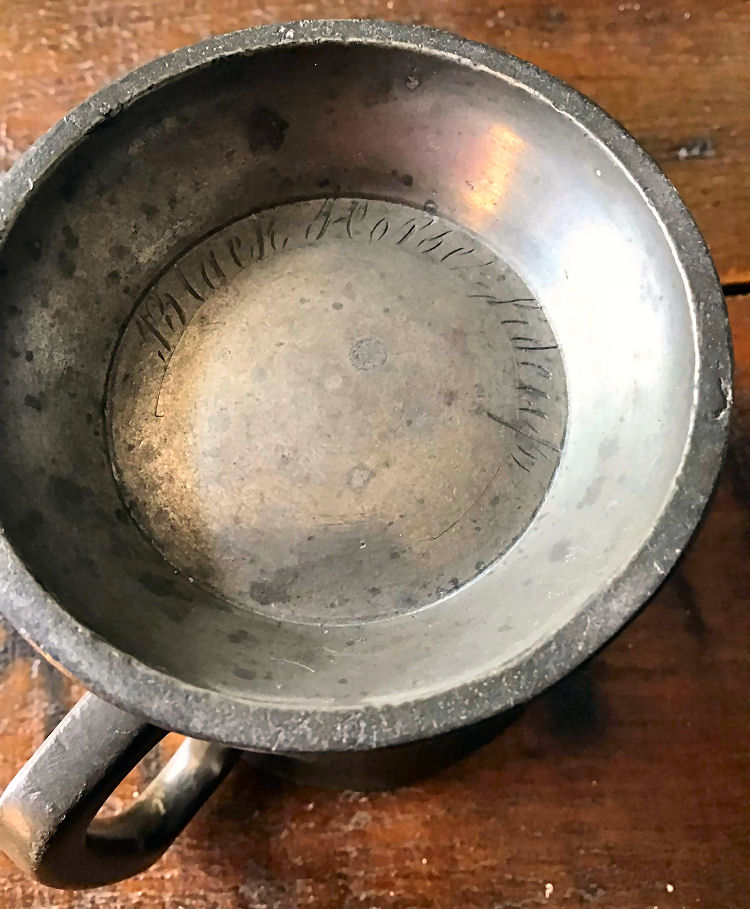
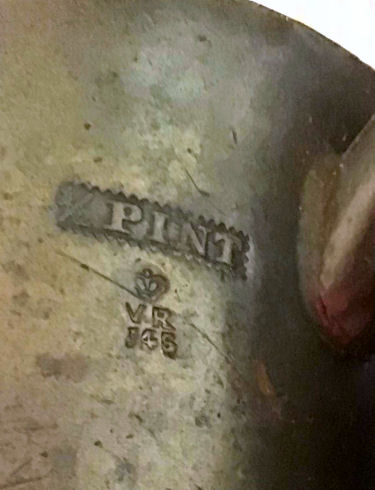 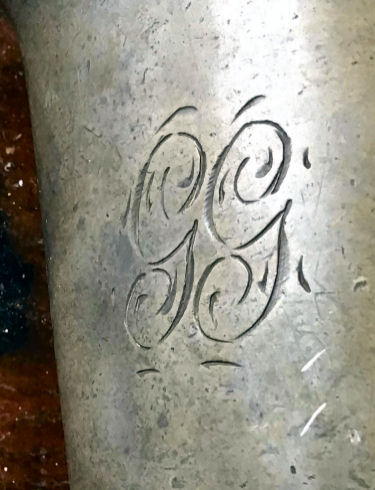
Above photos showing pewter mug possibly 1880s of George Gregory.
Kindly sent by Gemma Hayes. |
LICENSEE LIST
MASSEE John 1832+

COOMBS Edward 1841-43+ (age 50 in 1841 ) )
BLACKSHAW Jabas 1851+ (age 62 in 1851 ) )
BEACHAM John 1858-66+ (age 41 in 1861 ) )
GREGORY George 1881-82+ (age 43 in 1881 ) )
KADWELL George 1891-97+ (age 54 in 1891 ) )
GODDARD William James 1903+

BUXTON Thomas Arthur 1911-13+ (age 31 in 1911 ) )
FEIST Charles 1918-22+
THOMAS Archibald Ernest 1930-38+
https://pubwiki.co.uk/sidcup.shtml
http://www.closedpubs.co.uk/blackhorse.html
 From the Pigot's Directory 1832-33-34 From the Pigot's Directory 1832-33-34
 From the Kelly's Directory 1903 From the Kelly's Directory 1903
 Census Census
|


























